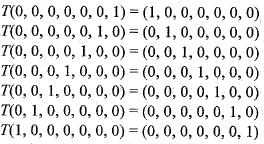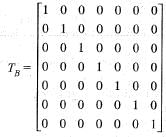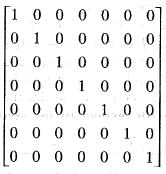Mathematics Exam > Mathematics Questions > Consider the linear transformation T : R7----...
Start Learning for Free
Consider the linear transformation T : R7----> R7 defined by T (x1, x2,......, x6, x7) = (x7, x6,..........,x2,x1)
Q. Which of the following statements is true.
Q. Which of the following statements is true.
- a)The determinant of T is different from 1
- b)There is no basis of R7 with respect to which T is diagonalisable
- c)T7 = I
- d)The smallest n such that Tn = I is even
Correct answer is option 'D'. Can you explain this answer?
| FREE This question is part of | Download PDF Attempt this Test |
Verified Answer
Consider the linear transformation T : R7----> R7defined byT (x1, x...
We are given that a linear transformation T : R7 —> R7 defined by

Let
 be an ordered basis of R
be an ordered basis of R
then
 So, the matrix corresponding to linear transformation T with respect to basis B is
So, the matrix corresponding to linear transformation T with respect to basis B is

Implies TB = I7x7
Now
 = 1
= 1
Thus, determinant of T is 1.
Now,
T(x1, x2, . . . , x6, x7) = (x7, x6, . . . , x2, x1)
Therefore, ,T(x1, x2, . . . , x6, x7)= T(T(x1, x2, . . . , x6, x7)) = T(x
= (x1, x2, . . . , x6, x7)
Implies that T2 = 1
Hence, the smallest n such that Tn = I is 2 which is an even number.
Also ,T3(x1, x2, . . . , x6, x7)
= T2(T(x1, x2, . . . , x6, x7)
= (x7, x6, . . . , x2, x1)
= T(x1, x2, . . . , x6, x7)
Implies that T3 = T
Implies T6 = (T3)2 = T2 = I Therefore,T7(x1, x2, . . . , x6, x7)
= T6(x7, x6, . . . , x2, x1) = T(x1, x2, . . . , x6, x7)
Implies T7 = T ≠ I

Let
 be an ordered basis of R
be an ordered basis of R7
then
 So, the matrix corresponding to linear transformation T with respect to basis B is
So, the matrix corresponding to linear transformation T with respect to basis B is
Implies TB = I7x7
Now

 = 1
= 1Thus, determinant of T is 1.
Now,
T(x1, x2, . . . , x6, x7) = (x7, x6, . . . , x2, x1)

Therefore, ,T(x1, x2, . . . , x6, x7)= T(T(x1, x2, . . . , x6, x7)) = T(x
7
, x6, . . . , x2, x1)= (x1, x2, . . . , x6, x7)
Implies that T2 = 1
Hence, the smallest n such that Tn = I is 2 which is an even number.
Also ,T3(x1, x2, . . . , x6, x7)
= T2(T(x1, x2, . . . , x6, x7)
= (x7, x6, . . . , x2, x1)
= T(x1, x2, . . . , x6, x7)
Implies that T3 = T
Implies T6 = (T3)2 = T2 = I Therefore,T7(x1, x2, . . . , x6, x7)
= T6(x7, x6, . . . , x2, x1) = T(x1, x2, . . . , x6, x7)
Implies T7 = T ≠ I
Most Upvoted Answer
Consider the linear transformation T : R7----> R7defined byT (x1, x...
The question is incomplete as it does not provide the rest of the information about the linear transformation T. Please provide the missing information for further assistance.

|
Explore Courses for Mathematics exam
|

|
Similar Mathematics Doubts
Consider the linear transformation T : R7----> R7defined byT (x1, x2,......, x6, x7) =(x7,x6,..........,x2,x1)Q. Which of the following statements is true.a)The determinant of T is different from 1b)There is no basis of R7 with respect to which T is diagonalisablec)T7 = Id)The smallest n such that Tn = Iis evenCorrect answer is option 'D'. Can you explain this answer?
Question Description
Consider the linear transformation T : R7----> R7defined byT (x1, x2,......, x6, x7) =(x7,x6,..........,x2,x1)Q. Which of the following statements is true.a)The determinant of T is different from 1b)There is no basis of R7 with respect to which T is diagonalisablec)T7 = Id)The smallest n such that Tn = Iis evenCorrect answer is option 'D'. Can you explain this answer? for Mathematics 2024 is part of Mathematics preparation. The Question and answers have been prepared according to the Mathematics exam syllabus. Information about Consider the linear transformation T : R7----> R7defined byT (x1, x2,......, x6, x7) =(x7,x6,..........,x2,x1)Q. Which of the following statements is true.a)The determinant of T is different from 1b)There is no basis of R7 with respect to which T is diagonalisablec)T7 = Id)The smallest n such that Tn = Iis evenCorrect answer is option 'D'. Can you explain this answer? covers all topics & solutions for Mathematics 2024 Exam. Find important definitions, questions, meanings, examples, exercises and tests below for Consider the linear transformation T : R7----> R7defined byT (x1, x2,......, x6, x7) =(x7,x6,..........,x2,x1)Q. Which of the following statements is true.a)The determinant of T is different from 1b)There is no basis of R7 with respect to which T is diagonalisablec)T7 = Id)The smallest n such that Tn = Iis evenCorrect answer is option 'D'. Can you explain this answer?.
Consider the linear transformation T : R7----> R7defined byT (x1, x2,......, x6, x7) =(x7,x6,..........,x2,x1)Q. Which of the following statements is true.a)The determinant of T is different from 1b)There is no basis of R7 with respect to which T is diagonalisablec)T7 = Id)The smallest n such that Tn = Iis evenCorrect answer is option 'D'. Can you explain this answer? for Mathematics 2024 is part of Mathematics preparation. The Question and answers have been prepared according to the Mathematics exam syllabus. Information about Consider the linear transformation T : R7----> R7defined byT (x1, x2,......, x6, x7) =(x7,x6,..........,x2,x1)Q. Which of the following statements is true.a)The determinant of T is different from 1b)There is no basis of R7 with respect to which T is diagonalisablec)T7 = Id)The smallest n such that Tn = Iis evenCorrect answer is option 'D'. Can you explain this answer? covers all topics & solutions for Mathematics 2024 Exam. Find important definitions, questions, meanings, examples, exercises and tests below for Consider the linear transformation T : R7----> R7defined byT (x1, x2,......, x6, x7) =(x7,x6,..........,x2,x1)Q. Which of the following statements is true.a)The determinant of T is different from 1b)There is no basis of R7 with respect to which T is diagonalisablec)T7 = Id)The smallest n such that Tn = Iis evenCorrect answer is option 'D'. Can you explain this answer?.
Solutions for Consider the linear transformation T : R7----> R7defined byT (x1, x2,......, x6, x7) =(x7,x6,..........,x2,x1)Q. Which of the following statements is true.a)The determinant of T is different from 1b)There is no basis of R7 with respect to which T is diagonalisablec)T7 = Id)The smallest n such that Tn = Iis evenCorrect answer is option 'D'. Can you explain this answer? in English & in Hindi are available as part of our courses for Mathematics.
Download more important topics, notes, lectures and mock test series for Mathematics Exam by signing up for free.
Here you can find the meaning of Consider the linear transformation T : R7----> R7defined byT (x1, x2,......, x6, x7) =(x7,x6,..........,x2,x1)Q. Which of the following statements is true.a)The determinant of T is different from 1b)There is no basis of R7 with respect to which T is diagonalisablec)T7 = Id)The smallest n such that Tn = Iis evenCorrect answer is option 'D'. Can you explain this answer? defined & explained in the simplest way possible. Besides giving the explanation of
Consider the linear transformation T : R7----> R7defined byT (x1, x2,......, x6, x7) =(x7,x6,..........,x2,x1)Q. Which of the following statements is true.a)The determinant of T is different from 1b)There is no basis of R7 with respect to which T is diagonalisablec)T7 = Id)The smallest n such that Tn = Iis evenCorrect answer is option 'D'. Can you explain this answer?, a detailed solution for Consider the linear transformation T : R7----> R7defined byT (x1, x2,......, x6, x7) =(x7,x6,..........,x2,x1)Q. Which of the following statements is true.a)The determinant of T is different from 1b)There is no basis of R7 with respect to which T is diagonalisablec)T7 = Id)The smallest n such that Tn = Iis evenCorrect answer is option 'D'. Can you explain this answer? has been provided alongside types of Consider the linear transformation T : R7----> R7defined byT (x1, x2,......, x6, x7) =(x7,x6,..........,x2,x1)Q. Which of the following statements is true.a)The determinant of T is different from 1b)There is no basis of R7 with respect to which T is diagonalisablec)T7 = Id)The smallest n such that Tn = Iis evenCorrect answer is option 'D'. Can you explain this answer? theory, EduRev gives you an
ample number of questions to practice Consider the linear transformation T : R7----> R7defined byT (x1, x2,......, x6, x7) =(x7,x6,..........,x2,x1)Q. Which of the following statements is true.a)The determinant of T is different from 1b)There is no basis of R7 with respect to which T is diagonalisablec)T7 = Id)The smallest n such that Tn = Iis evenCorrect answer is option 'D'. Can you explain this answer? tests, examples and also practice Mathematics tests.

|
Explore Courses for Mathematics exam
|

|
Suggested Free Tests
Signup for Free!
Signup to see your scores go up within 7 days! Learn & Practice with 1000+ FREE Notes, Videos & Tests.


















